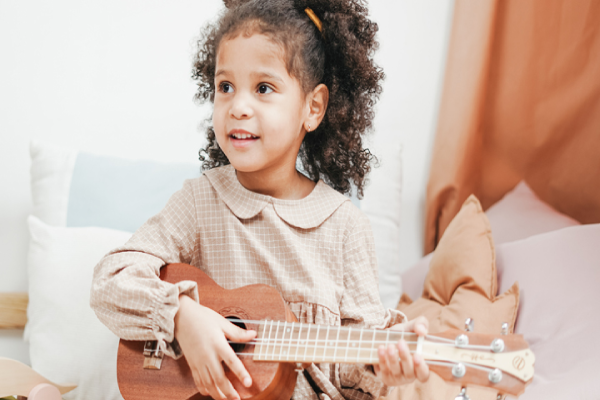Before anything else,
Humans are predisposed to be creative and expressive.
Art and music aid in the translation of creative thought into a readable object that can be shared with others in a variety of ways. Art can provide an outlet for children who are unable to express themselves verbally or in writing, without making them feel judged for their work. Children benefit from developing their artistic skills at a young age because it improves cognitive abilities such as spatial reasoning, which helps later on when studying math and science subjects where it comes up frequently; being exposed to different ideas about cultural identity while exploring mediums of self-expression such as visual arts may foster greater empathy toward cultures other than their own.
Music is the starting point for raising intelligent children.
As they grow, your child should be learning to read and write. Their biggest challenge was to overcome this, and music was the perfect medium for them! According to studies, children who are exposed to musical activities on a regular basis, such as playing an instrument or singing, can develop their brain power in a variety of ways, including academic achievement (such as reading and math) and emotional development. It’s not just about having fun: think of music lessons as a form of education; incidental exposure should not be the only way a child is properly educated on all things musically inclined!
Art has a positive influence on children.
The arts can be a powerful tool for inspiring children and motivating them to pursue an education. According to research, students who participate in the arts benefit academically more, are more motivated, have better attitudes, and attend more classes than those who are not exposed to art. Art keeps children engaged in their studies both inside and outside of the classroom, allowing them to perform well on tests and homework. Children who participate in art programmes are more motivated than those who do not; they also have higher attendance rates, positive attitudes toward academics, higher test scores, and they achieve more academically overall, which is fantastic news!
Music Can Help You Improve Your Memory:
There appears to be a simple way to help your children remember their homework assignments, where they put their shoes, or even brushing their teeth before bed. Music participation at a young age has been shown to improve memory, and early exposure helps children learn both word sounds and meanings.
Dancing also aids in the development of motor skills in children, which benefits not only them but also you! Adults can improve their memory simply by listening to music…so listen to some music if you have schoolwork due!
Music And Art Stimulate Creativity:
Children can express themselves creatively through music, which can help them later in life.Music and art can be effective tools for fostering creativity, which can have a positive impact on many aspects of your child’s life. Children who are encouraged to participate in the arts develop innovative skills that will help them in the future; 72% of employers say they look for creative candidates when hiring!
Children’s Development of Important Life Skills Is Aided by Music:
Playing an instrument can assist children in developing important life skills such as teamwork, leadership, and discipline. According to a recent study, music groups and ensembles teach young people how to better relate to others by allowing them to share their experiences in a group setting. This gave children and teenagers something to do in their spare time while also giving them some control over what was going on around them. It also aided in the development of confidence for those who struggled to relate more broadly across social settings when meeting new people; these are all excellent qualities that will come in handy later in life, especially when applying for jobs!
Art And Music Can Help You Improve Your Language And Reading Skills:
Art and music are essential for the development of children’s language skills. According to a 2016 study, both art and music improved young students’ reading and language acquisition skills. Music, in particular, has aided cognitive development abilities such as empathy, which is critical not only for our country but also for the rest of the world. Playing an instrument or painting can be beneficial for children aged 3 to 5 years old because it allows them to learn new words while also developing their creative side!
Art and music are good for the brain! Art education aids in the development of critical thinking skills in children. According to studies, children who learn to play the piano outperform those who do not receive music instruction/training on spatial-temporal reasoning tests. And the more musical training a child receives, the better he or she will become at these tasks (spatial- temporal reasoning). So, if you want to improve your grades or just have a sharper mind in general, start practising some Mozart today!
Art and music Improve Your Self-Confidence:
Children gain confidence as a result of their involvement in art and music because they become more accomplished artists, musicians, or composers. According to studies, children develop a sense of self-esteem when they participate in arts activities with their peers and provide constructive criticism while also praising their work.
Art And Music Promote Cross-cultural Exchange:
Learning about different cultures through art can be a fantastic way to broaden one’s horizons. As they interpret visual imagery from artists, students gain cultural awareness and an understanding of diversity. Art and music can also help people feel closer to one another. Experiencing a different culture through visual mediums such as sculptures or paintings can provide children with fresh perspectives on their own world.
Seeing abstract art by Piet Mondrian, for example, allows you to analyse it as if you were looking out your window at an unfamiliar landscape; taking your time digesting all of the component parts before exploring without fear of being lost in translation with what may appear foreign concepts.
Art And Music Instil Discipline:
Art and music teach children discipline by instilling concepts such as commitment, dedication, practise, and so on. While some people appear to have a natural talent in one or more areas at first glance, there is always more to the storey than meets the eye.
Aside from art, children learn a lot about subjects such as math, such as how intrinsic motivation is often more valuable than external rewards (proud parents).
Conclusion:
Learning to play an instrument can aid in the development of discipline and self-discipline in children. Children who practise at home on their own time as well as participate in music lessons delivered during school hours will develop valuable life skills that will not only help them become better musicians, but will also help them develop other traits such as perseverance and patience, which will be useful to them regardless of their career choice.
Even if students do not intend to become professional musicians or join musical groups after high school or college, the combination of daily practise outside of the classroom and weekly class sessions helps them develop habits such as discipline and perseverance that are beneficial to them more than just musically.






